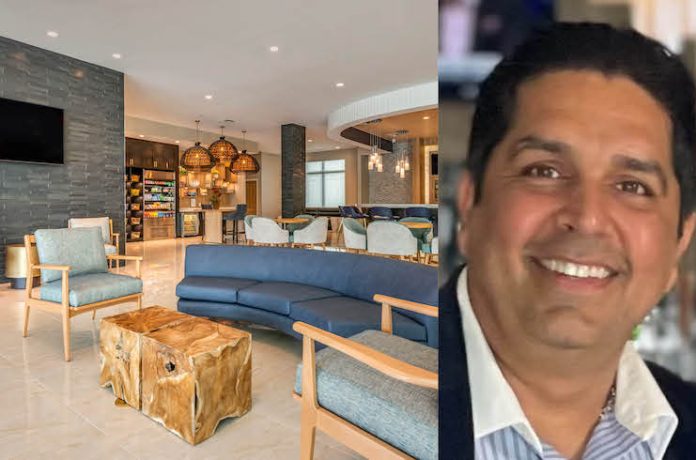
LODGING brings you the third installment of our three-part Ownership Series, providing owner perspectives on various hot topics and industry trends. We speak with Jai Motwani of Hotel Motel Inc. on development and guest service trends in the leisure market.

Jai Motwani’s family roots in the South Florida hotel industry have served him well. Back in the 1980s, his father foresaw that the state was poised to become a world-class leisure destination and moved the family real estate business from St. Louis, Missouri, to Fort Lauderdale, where he bought about a dozen “mom and pop” beachfront motels that allowed him to capitalize on the Spring Break influx. “My generation is now redeveloping those properties into upscale and midscale hotels. But we tip our hats off to our parents because they had the vision and the wherewithal to purchase these pieces of land,” said Motwani, now owner of Fort Lauderdale-based Hotel Motel Inc., whose services range from property acquisition and development to pre-opening and operations.
Motwani’s first new property built on the family’s South Florida land was the 104-room Cambria Hotel Fort Lauderdale Beach, located in what has now become an “extremely high barrier-to-entry market, where land costs about $10 million for a project like this,” he noted. Hotel Motel Inc. is also bringing Choice Hotels International’s Cambria brand to Daytona Beach with a new-build property breaking ground next year. Like Fort Lauderdale, Daytona is another dynamic leisure destination, and Hotel Motel Inc. has already had success in the market with the Emerald Shores Hotel and The Seascape Inn. Rounding out its current portfolio are the Country Inn & Suites by Radisson in Tampa and Ozark Mountain Inn in Branson, Missouri.
“We are now predominantly driven to stay in Florida,” said Motwani, whose company is looking at development opportunities in coastal hotspots like the Jacksonville area, Pensacola, and Jupiter. A particularly promising market is Destin, which offers “oceanfront land at relatively reasonable prices, and there’s not too much supply,” he noted.
Leisure Market Appeal
Motwani’s decision to focus on the leisure market was not just based on his family’s owning land in a prominent leisure destination. In addition, he appreciates the segment’s versatility and resilience. “The leisure market attracts a variety of individuals; there’s no specific demographic. You’re attracting families, business travelers, seniors, etc.,” he explained. “And through the pandemic, our segment performed the best. Post pandemic, we were the No. 1 segment; we recovered the quickest. We probably saw the most robust year ever in 2022.”
And while corporate groups and business travelers aren’t his company’s target customers, Motwani has seen his properties drawing more interest from that segment. “Since the pandemic, everybody is putting more of an emphasis on being outdoors, and we’ve noticed that there is a huge business segment that wants to be near the beach,” he said. For example, “we just had a Fortune 500 company—one of the largest toy companies in the world—reach out to us. They booked a Segway tour on the beach for 40 participants to do teambuilding.”
Leisure Differentiators
Standing out in the highly competitive leisure market isn’t easy, but there are several amenities, services, and property features that Motwani believes can help to distinguish a hotel among its competitors, or at least stay on par with them. Among them are a robust concierge service, in-house dry cleaning, hot tubs in addition to pools, and the following:
High-Quality Wi-Fi. “The world has changed since the pandemic, and a lot of people now are spending time in hotels for multiple reasons, whether it’s a weekend getaway or a work getaway. And we’re noticing that high-quality Wi-Fi is an extremely important aspect of the business,” he said.
Guestroom Automations. Motwani’s company has deployed XFINITY’s new X1 platform at its new properties, allowing guests to enjoy voice-activated controls for TV, music, and even air conditioning. He also cited guestroom Bluetooth mirrors—a distinctive amenity of the Cambria brand—as a leading-edge guestroom technology.
Sustainability. Eco-tourism is an increasingly strong trend in the leisure segment, and Motwani has seen a significant increase in business from travelers looking for sustainable lodgings. “Many OTAs have a sustainability index for each hotel, and we’ve noticed a huge uptick in [business for] the Cambria Fort Lauderdale, for instance, because of its high sustainability rating,” he said. The property features energy-saving technology driven by guestroom occupancy sensors, for example.
Innovative F&B Services. While leisure guests are often exploring the destination and dining out, compelling onsite dining options are still important, says Motwani, whose Cambria Hotel Fort Lauderdale Beach will be adding a second full-service restaurant soon. More informal F&B services that complement guests’ onsite leisure activities can also be a differentiator. “We have this new offering at the Cambria Fort Lauderdale for guests who want to dine on the beach: for $50, we will package their lunch and beverages, and they’ll get a little buggy with an umbrella, a cart, and two chairs to enjoy the beach for the day,” he noted.
Lastly, Motwani stressed that no matter how trendy or upscale the amenities and services, a leisure property cannot succeed without a staff that has mastered the basic people skills of hospitality. The most effective means of attracting and retaining guests remains “professionalism, prioritizing our customer, and giving them great service from the moment they walk in the door,” he said.
Construction Contingency Plans
Maximizing guest appeal with the right amenities and excellent service help translate to more bookings and more profit, which is especially important to offset the costs involved in new-build leisure hotels. Apart from the real estate investment, construction in beach destinations can sometimes end up becoming more costly than anticipated due to weather-related setbacks, such as hurricanes and sea-level rises. It is important for developers to be aware of these potential issues, as they require contingency plans.
“You need good financial and weather contingency plans, and you also need a labor contingency because when developing in leisure markets, labor is very difficult to come by,” Motwani advised. “If you have a storm coming, you have a week of prep, a week of cleanup, and then a week to remobilize. And you need to have funds available for both labor and the materials required to board up.” He related that for one of his company’s 2022 coastal projects, they had to disassemble a crane due to an incoming storm, as well as significantly increase the dewatering budget due to a sea-level surge. And while these expenses are only potential, the cost of insurance is a constant that is rising exponentially for coastal hotels. “Having no insurance is not an option. So, we’re rolling up our sleeves and we’re paying for it,” he said.
2024 Outlook
Despite these challenges, hotels in the leisure market have been strong post-pandemic performers, and Motwani expects that trend to continue next year. He predicts a “more typical business cycle” in 2024 that falls somewhere between the recording-breaking bookings of 2022 due to pent-up demand, and the moderate decline in 2023 due to the attraction of reopened destinations in Europe. One factor that may negatively impact U.S. travel next year is the election. “During election years, usually you start to see a little tightening of the belt, if you will, and less travel,” he observed. “But in the end, Florida is a hot market, and I think it will continue to be. Already our first quarter is better than Q1 2023, which gives me a good indication that we’re going to see some normalization come back in 2024. So, we’re cautiously optimistic.”











